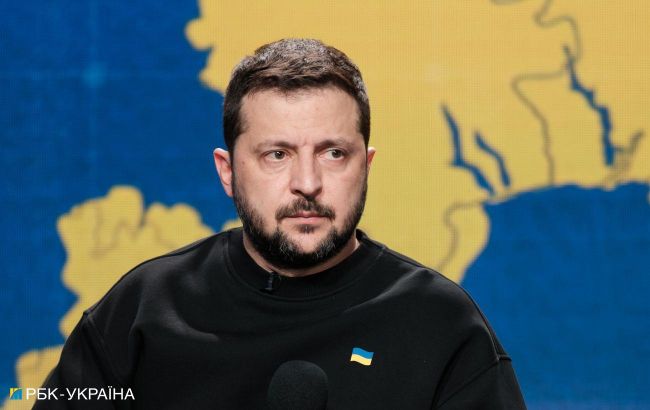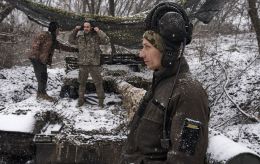Zelenskyy on mobilization, Putin and battle for Crimea in interview with The Economist
 President of Ukraine Volodymyr Zelenskyy (Vitalii Nosach/RBC-Ukraine)
President of Ukraine Volodymyr Zelenskyy (Vitalii Nosach/RBC-Ukraine)
President of Ukraine Volodymyr Zelenskyy considers Russian dictator Vladimir Putin an animal and sees no prerequisites for peace talks. In his opinion, the battle for Crimea will be central to the current war, and there is no alternative to increased mobilization.
Volodymyr Zelenskyy is angry, but not because of the successes of his enemies (he does not see them) or even because of the army's lack of progress on the battlefield. The President of Ukraine is irritated by the instability of some allies, as well as the alienation of some Ukrainians.
Hardened by the hardships of war and the failure of a promising counteroffensive, he has lost the lightness and humor that characterized his previous interviews. After Russia's invasion on February 24, 2022, Zelenskyy woke up the world and mobilized the country with a 32-second video recorded on his phone in which he simply said: "We are here." He and his team are still in the government complex in Kyiv.
Russia is still striking in Kyiv, Dnipro, Kharkiv, Odesa, and elsewhere, but the world is not listening as closely, and the chief communicator no longer controls the agenda as he did two years ago. In Ukraine, fatigue is setting in, and in the West, headlines are asking whether Russian dictator Vladimir Putin has begun to win. Helping Ukrainians has become a political bargaining chip in America and Europe.
On the existential threat and the idea of Putin's victory
According to Zelenskyy, the West has lost its urgency, and many Ukrainians have lost their sense of existential threat. He is now trying to revive both.
"Maybe we did not succeed [in 2023] as the world wanted. Maybe not everything is as fast as someone imagined," he says.
But the idea that Putin is winning is nothing more than a "feeling". The reality is that Russian troops are still grinding away in places like Avdiivka, where Zelenskyy recently returned from. UK military intelligence sources estimate that on current trends, Russia will lose more than 500,000 killed and wounded by 2025.
"Thousands, thousands of killed Russian soldiers," he emphasizes.
According to him, Putin's army failed to take a single major city in 2023, while Ukraine managed to break the Black Sea blockade and is now sending millions of tons of grain via a new route that runs along the southern coast. "Huge result!" the president declares.
But in a war that has become a resource mobilization, the belief among Ukraine's supporters that victory has become impossible risks depriving it of the money and weapons it needs to win. Fatalism can become a self-fulfilling prophecy.
On the support of allies. "Putin feels weakness like an animal"
The next year is crucial in this regard. With Russia's military efforts gaining momentum and Ukraine's resources depleting, the attention of the United States and many European countries is shifting to domestic politics in an election year. Zelenskiyy's task is more difficult than ever, and the stakes are higher than ever.
Central to Zelenskyy's argument is that by supporting Ukraine, Europe is protecting itself from Russian aggression.
"Giving us money or giving us weapons, you support yourself. You save your children, not ours," he warns grimly.
If Russia is allowed to take Ukrainian children, they will take other children. If Russia violates the rights of Ukrainians, "it will violate the rights in the world." If Ukraine loses, Putin will bring his war closer to the West.
"Putin feels weakness like an animal because he is an animal. He senses blood, he senses his strength. And he will eat you for dinner with all your EU, NATO, freedom, and democracy," Zelenskyy adds.
He defends his point of view: "Maybe something is missing. Or maybe someone is missing. Someone who can talk about Ukraine as a defense of all of us." European countries should put pressure on America to support Ukraine for their own sake.
"Intelligence services of several European countries have started to [examine] a possibility of attack on their territory from Russia... Even those countries that were not in the USSR," the President says.
On negotiations with Russia
Regarding the proposals for negotiations, Zelenskyy does not see "any fundamental steps forward to the peace from Russia." Instead, Ukraine is experiencing a flurry of air attacks on cities in the east, south, north, and west.
"I see only the steps of a terrorist country," Zelensky says.
And if Russia sends signals of a desire to freeze the conflict, as some Western media report, "it's not because they are righteous, but because they don't have enough missiles, ammunition, or trained troops. They need this pause. To restore all their strength. And then turn the page on this war with all their might."
On Crimea becoming the epicenter of the war
Zelenskyy says little about what Ukraine can achieve in 2024. He says the leak of information before last summer's counteroffensive helped Russia prepare its defenses.
But if he does have a message, it is that Crimea and the related Black Sea battle will be the epicenter of the war. The isolation of Crimea, illegally annexed by Russia in 2014, and the degradation of Russian military capabilities on the peninsula "is extremely important for us, because it is the way for us to reduce the number of attacks from that region," he says.
In his opinion, a successful operation in Crimea would set an example for the whole world. It would also have a big effect on Russia. The loss of the centerpiece of the Kremlin's propaganda would show that "thousands of Russian officers died just because of Putin’s ambition."
Ukraine is already scoring incredible victories on the strategically important peninsula, destroying a significant number of Black Sea Fleet ships. British officials say that in the last four months alone, a fifth of the fleet has been destroyed. Losing the naval bases that Russia has held for the past 240 years would be a huge embarrassment for Putin.
However, the speed of any success depends on military assistance from Western partners. Zelenskyy has requested German long-range stealthy Taurus cruise missiles capable of exploding deep inside a target. They could destroy the $4 billion Kerch Bridge, effectively isolating Crimea from Russia.
"Russia has to know that for us this is a military object," Zelenskyy says and believes that Germany is not the only Western power standing in his way.
On the immediate task
Zelenskyy is even less forthright about his goals in the east and south. The states ambition to return to the 1991 borders has not changed and will not change. But the president no longer sets time frames or makes promises about how much territory Ukraine can liberate in 2024.
His immediate task in the land war will be "to defend the east, to save these very important cities of Ukraine, east and south, Kharkiv, Dnipro, Zaporizhzhia, Kherson, Mykolaiv," as well as his country's critical infrastructure.
On relying on our strength
Exaggerated expectations before the 2023 counteroffensive partly led to disappointment. In a November interview with The Economist, Armed Forces Commander-in-Chief Valerii Zaluzhnyi acknowledged the stalemate on the battlefield. While this initially provoked an angry reaction from Zelenskyy, it also provided an opportunity to change his message.
To endure a grueling war, not only the West needs to mobilize, but also Ukraine itself.
"We must consider our own strength," Zelenskyy says.
While he believes that America will eventually provide military assistance, Ukraine is also increasing its production in case Western supplies are not enough. He repeated this message in his New Year's address, which was less optimistic than last year's.
As part of his "plan B," he asked the U.S. government to grant Ukraine licenses to produce weapons, including artillery systems and air defense missiles.
On mobilization in Ukraine
The President believes that today there is no such mobilization of Ukrainian society and the world as at the beginning of the war, and this must be changed. Polls show that lowering the mobilization age from the current 27 to 25 years and reducing the grounds for deferment are not popular. But Zelenskyy insists there is no alternative.
"Mobilization is not just a matter of soldiers going to the front. It is about all of us. It is the mobilization of all efforts. This is the only way to protect our state and de-occupy our land. Let’s be honest, we have switched to domestic politics," Zelenskyy says.
And this is a choice that Ukrainians will have to make.
"If we continue to focus on domestic politics, we need to call elections. Change the law, the constitution. But forget about counter-offensive actions and de-occupation," he adds.
The President remains convinced that Ukraine cannot abandon its plan to defeat Russia.
"The most important profession a Ukrainian can do at the moment is to be in Ukraine…and for our Western partners, it is to be with Ukraine…If you don’t have the strength, then either get out or step aside. We will not retreat," Zelenskyy says.
The question is whether the chief communicator of 2022 will be able to convince the rest of the world to share his views.

